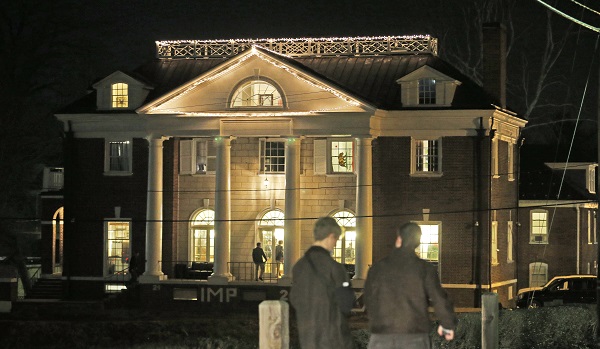
Students participating in rush pass by the Phi Kappa Psi house at the University of Virginia in Charlottesville, Va., in this Jan. 15, 2015 file photo. Now the Columbia Graduate School of Journalism is about to explain how it all went so wrong. The school’s analysis of the editorial process that led to the November 2014 publication of “A Rape on Campus” will be released online at 8 p.m. EDT Sunday April 5, 2015. AP FILE PHOTO
RICHMOND, Virginia — Rolling Stone magazine has apologized and officially retracted its discredited article about an alleged gang rape at the University of Virginia, and an independent review said the article may cast doubt on future rape accusations.
The review, undertaken at Rolling Stone’s request, presented a broad indictment of the magazine’s handling of a story that had horrified readers, unleashed widespread protests and sparked a national discussion about sexual assaults on college campuses.
The report released Sunday from the Columbia University Graduate School of Journalism on the editorial process called the article a “story of journalistic failure that was avoidable.”
The article focused on a student identified only as “Jackie,” who said she was raped by seven men at a fraternity house. It also described a hidden culture of sexual violence fueled by binge drinking at one of the nation’s most highly regarded public universities.
The report found, among other things, that Rolling Stone did not try hard enough to find the person Jackie accused of orchestrating the assault.
The independent review began after news media organizations exposed flaws in the November 2014 article, titled “A Rape on Campus.” By Dec. 5, Rolling Stone apologized and acknowledged discrepancies in the article.
A four-month police investigation produced no evidence that the attack occurred. Jackie refused to cooperate in the police investigation.
“We would like to apologize to our readers and to all of those who were damaged by our story and the ensuing fallout, including members of the Phi Kappa Psi fraternity and UVA administrators and students,” the magazine’s managing editor, Will Dana, wrote on the publication’s website.
“Sexual assault is a serious problem on college campuses, and it is important that rape victims feel comfortable stepping forward. It saddens us to think that their willingness to do so might be diminished by our failings.”
In a statement sent to The Associated Press, writer Sabrina Erdely apologized and said she “did not go far enough to verify” the story of the victim.
Dana and Erdely said they had been too accommodating of requests from Jackie that limited their ability to report the story because she said she was a rape victim and asked them not to contact others to corroborate, the report said.
Despite its flaws, the article heightened scrutiny of campus sexual assaults amid a campaign by President Barack Obama. The University of Virginia had already been on the Department of Education’s list of 55 colleges under investigation for their handling of sex assault violations.
The article also prompted university President Teresa Sullivan to temporarily suspend fraternity and sorority social events. Fraternities later agreed to ban kegs, hire security workers and keep at least three fraternity members sober at each event.
In a statement, Sullivan said the article falsely depicted the university as callous toward sexual assault victims, reinforcing their reluctance to come forward.
The fraternity has called the article defamatory and said it was exploring its legal options.
“These false accusations have been extremely damaging to our entire organization, but we can only begin to imagine the setback this must have dealt to survivors of sexual assault,” said Stephen Scipione, president of the Virginia Alpha Chapter of Phi Kappa Psi, after the Charlottesville police suspended their investigation.